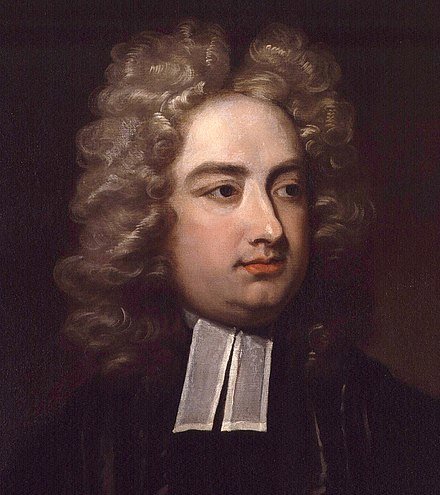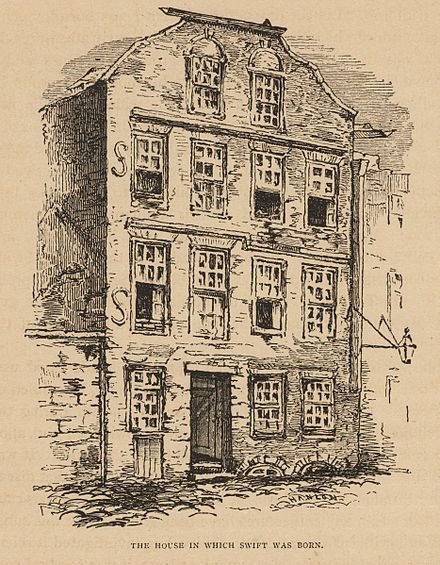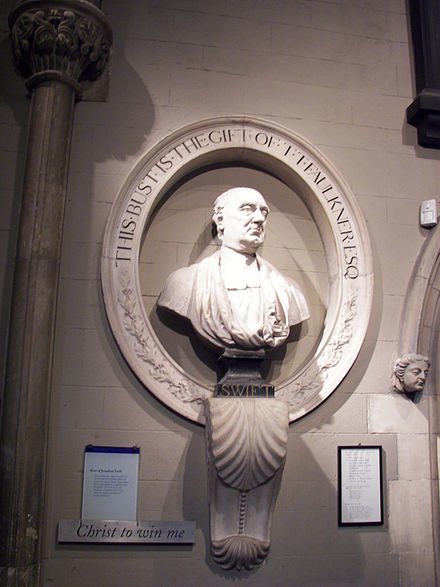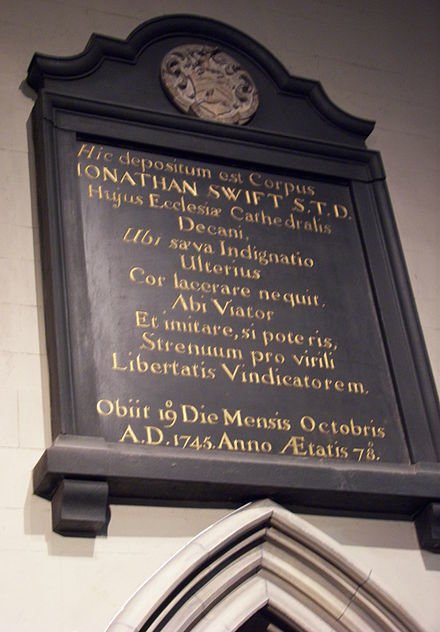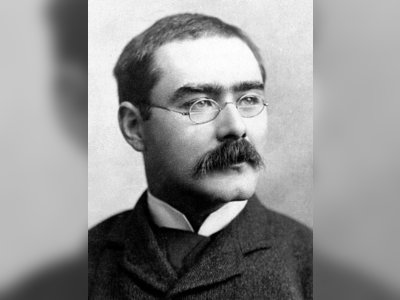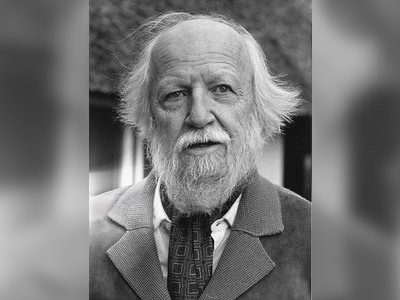British Heritage
Remember, Cherish, Learn.
beta
Jonathan Swift - The Supreme Satirist
Contribution to British Heritage.
Jonathan Swift, an eminent Anglo-Irish satirist, essayist, political pamphleteer, poet, and Anglican cleric, left an indelible mark on British heritage through his scathing and thought-provoking literary works. Born on November 30, 1667, in Dublin, Ireland, Swift's contributions to English-language prose satire are unparalleled, with his writings continuing to set the standard even three centuries after his time. Often referred to as "Dean Swift" due to his position as the Dean of St Patrick's Cathedral in Dublin, he is remembered for his iconic works such as "A Tale of a Tub," "An Argument Against Abolishing Christianity," "Gulliver's Travels," and "A Modest Proposal."
Swift's satirical prowess, both in the Horatian and Juvenalian styles, earned him the reputation of the foremost prose satirist in the English language, and his writing style, characterized by deadpan irony, came to be known as "Swiftian." While his satire was cutting and piercing, it also had the ability to provoke deep reflection and inspire societal change. His literary contributions have left an enduring impact on British heritage, shaping the course of English literature and influencing subsequent generations of writers.
Jonathan Swift was born to Jonathan Swift and Abigail Erick (or Herrick) of Frisby on the Wreake on November 30, 1667. His father, originally from Goodrich, Herefordshire, moved to Ireland in pursuit of better prospects in law after the English Civil War. Tragically, Swift's father passed away from syphilis shortly before his birth. His mother returned to England soon after, leaving young Jonathan under the care of his uncle, Godwin Swift, who played a significant role in his upbringing.
Swift's early education took place at Kilkenny College, and later, he attended Trinity College Dublin, graduating with a Bachelor of Arts degree in 1686. He pursued further studies for his master's degree in England but was forced to return to Ireland in 1688 due to political turmoil surrounding the Glorious Revolution.
Swift's literary career took off when he became the personal assistant and secretary to Sir William Temple, an English diplomat, and writer. Temple's estate, Moor Park, became Swift's home, and it was during this time that he met Esther Johnson, whom he affectionately called "Stella." Their relationship remained a subject of speculation and intrigue throughout their lives.
During his tenure at Moor Park, Swift wrote "A Tale of a Tub" and "The Battle of the Books," which established him as a writer of remarkable wit and satirical skill. These early works reflected his growing interest in social and political commentary.
Swift's political involvement intensified when he returned to Ireland and was ordained as an Anglican priest. He served in various capacities, including as a chaplain and a prebendary. During this period, he authored the famous "Drapier's Letters," a series of pamphlets that vehemently opposed the British government's plan to issue debased copper coinage in Ireland. His writings mobilized public opinion and played a pivotal role in preventing the implementation of the government's proposal.
Undoubtedly, Swift's magnum opus is "Gulliver's Travels," published in 1726. Written under the pseudonym Lemuel Gulliver, the novel narrates the extraordinary voyages of the protagonist to fictional lands, each representing a satirical commentary on various aspects of human society and government. The work is divided into four parts: Lilliput, Brobdingnag, Laputa, and the land of the Houyhnhnms.
In Lilliput, Gulliver encounters a land of tiny people, satirizing the pettiness and absurdity of politics and power struggles. Brobdingnag, on the other hand, exposes the flaws of human nature when Gulliver finds himself in a land of giants. The third voyage, to Laputa, takes Gulliver to a floating island inhabited by impractical intellectuals, critiquing the detachment of scholars from practical reality. Finally, Gulliver reaches the land of the Houyhnhnms, where intelligent horses rule over human-like creatures called Yahoos, presenting a stark contrast between rationality and brutishness.
"Gulliver's Travels" remains an enduring classic, cherished for its wit, imagination, and profound insight into the human condition.
Jonathan Swift's literary legacy has left an indelible mark on English literature and British heritage. His works continue to be studied, celebrated, and adapted across various media, inspiring generations of writers and satirists. His sharp critique of society, politics, and human nature endures as a relevant and thought-provoking commentary even in modern times.
Beyond his literary contributions, Swift's impact on British heritage is also evident in his advocacy for Irish causes. As an Irish patriot, he vehemently championed the rights of the Irish people and sought to alleviate their sufferings under British rule.
In his later years, Swift faced personal hardships, experiencing deteriorating health and losing close friends. He passed away on October 19, 1745, at the age of 78. His final years were marked by declining mental health, which some historians attribute to terminal dementia.
In honour of Swift's significant contribution to British heritage, monuments and festivals commemorating his life and works can be found in his long-time residence of Trim, Ireland.
Jonathan Swift's legacy continues to endure, and his name remains synonymous with masterful satire, making him a lasting icon of English literature and a cherished figure in British heritage. His writings serve as a testament to the power of words to effect change and the enduring impact of satire as a vehicle for social and political commentary.
Swift's satirical prowess, both in the Horatian and Juvenalian styles, earned him the reputation of the foremost prose satirist in the English language, and his writing style, characterized by deadpan irony, came to be known as "Swiftian." While his satire was cutting and piercing, it also had the ability to provoke deep reflection and inspire societal change. His literary contributions have left an enduring impact on British heritage, shaping the course of English literature and influencing subsequent generations of writers.
Early Life
Jonathan Swift was born to Jonathan Swift and Abigail Erick (or Herrick) of Frisby on the Wreake on November 30, 1667. His father, originally from Goodrich, Herefordshire, moved to Ireland in pursuit of better prospects in law after the English Civil War. Tragically, Swift's father passed away from syphilis shortly before his birth. His mother returned to England soon after, leaving young Jonathan under the care of his uncle, Godwin Swift, who played a significant role in his upbringing.
Swift's early education took place at Kilkenny College, and later, he attended Trinity College Dublin, graduating with a Bachelor of Arts degree in 1686. He pursued further studies for his master's degree in England but was forced to return to Ireland in 1688 due to political turmoil surrounding the Glorious Revolution.
Literary and Political Career
Swift's literary career took off when he became the personal assistant and secretary to Sir William Temple, an English diplomat, and writer. Temple's estate, Moor Park, became Swift's home, and it was during this time that he met Esther Johnson, whom he affectionately called "Stella." Their relationship remained a subject of speculation and intrigue throughout their lives.
During his tenure at Moor Park, Swift wrote "A Tale of a Tub" and "The Battle of the Books," which established him as a writer of remarkable wit and satirical skill. These early works reflected his growing interest in social and political commentary.
Swift's political involvement intensified when he returned to Ireland and was ordained as an Anglican priest. He served in various capacities, including as a chaplain and a prebendary. During this period, he authored the famous "Drapier's Letters," a series of pamphlets that vehemently opposed the British government's plan to issue debased copper coinage in Ireland. His writings mobilized public opinion and played a pivotal role in preventing the implementation of the government's proposal.
Masterpiece - Gulliver's Travels
Undoubtedly, Swift's magnum opus is "Gulliver's Travels," published in 1726. Written under the pseudonym Lemuel Gulliver, the novel narrates the extraordinary voyages of the protagonist to fictional lands, each representing a satirical commentary on various aspects of human society and government. The work is divided into four parts: Lilliput, Brobdingnag, Laputa, and the land of the Houyhnhnms.
In Lilliput, Gulliver encounters a land of tiny people, satirizing the pettiness and absurdity of politics and power struggles. Brobdingnag, on the other hand, exposes the flaws of human nature when Gulliver finds himself in a land of giants. The third voyage, to Laputa, takes Gulliver to a floating island inhabited by impractical intellectuals, critiquing the detachment of scholars from practical reality. Finally, Gulliver reaches the land of the Houyhnhnms, where intelligent horses rule over human-like creatures called Yahoos, presenting a stark contrast between rationality and brutishness.
"Gulliver's Travels" remains an enduring classic, cherished for its wit, imagination, and profound insight into the human condition.
Legacy and Influence
Jonathan Swift's literary legacy has left an indelible mark on English literature and British heritage. His works continue to be studied, celebrated, and adapted across various media, inspiring generations of writers and satirists. His sharp critique of society, politics, and human nature endures as a relevant and thought-provoking commentary even in modern times.
Beyond his literary contributions, Swift's impact on British heritage is also evident in his advocacy for Irish causes. As an Irish patriot, he vehemently championed the rights of the Irish people and sought to alleviate their sufferings under British rule.
In his later years, Swift faced personal hardships, experiencing deteriorating health and losing close friends. He passed away on October 19, 1745, at the age of 78. His final years were marked by declining mental health, which some historians attribute to terminal dementia.
In honour of Swift's significant contribution to British heritage, monuments and festivals commemorating his life and works can be found in his long-time residence of Trim, Ireland.
Jonathan Swift's legacy continues to endure, and his name remains synonymous with masterful satire, making him a lasting icon of English literature and a cherished figure in British heritage. His writings serve as a testament to the power of words to effect change and the enduring impact of satire as a vehicle for social and political commentary.
- Jonathan Swiften.wikipedia.org
